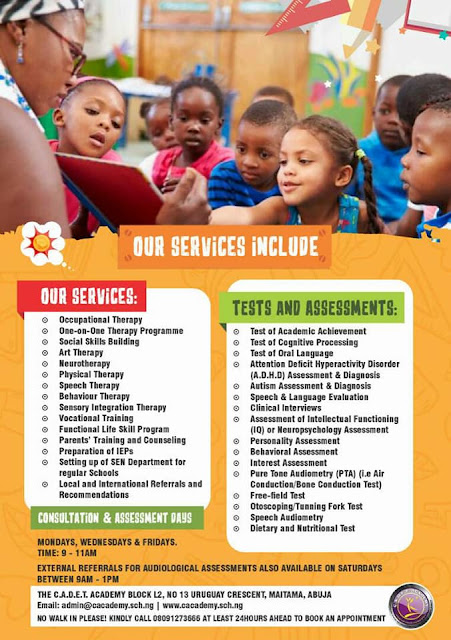Wednesday, 21st of March was World Down Syndrome Day, and the theme for this year's celebration was "What I bring to My Community". Dr PJ Fakudze and I started our Special Needs Advocacy outreach that day by speaking at The Centagon International School, Maitama, Abuja with a group of parents on the topics "Stages of a Child's Development" and "Discovering your Child's Special Needs and Talents". Thereafter, we headed straight to 96.9 Cool FM radio station to join Edima Usoro and we had such a funfilled time discussing the topic " Let's Talk about Down Syndrome".
The following day at 99.9 Kiss FM, we held our Weekly Special Needs Radio Show and this edition was very enlightening with our guest Dr. Moses Fache, a consultant Gynaecologist and Obstetrician, fertility expert and a public health physician. He is also the Founder and Medical Director of El-Rapha Hospitals and Diagnostics, Life Camp, Abuja and he did justice to all the questions asked concerning Down Sydrome (DS).
The third form, which is very rare, is partial trisomy 21 due to Robertsonian Translocation, accounts for 2-3 percent of cases. In this case a part of 21st chromosome breaks up during the cellular division, "moves" and attaches itself to another chromosome, usually the 14th chromosome or the other 21st chromosome. Some extra genetic material is present in both cases. About 2/3rds of translocation occur spontaneously during fertilisation. The translocation is hereditary from one of the two parents in 1/3rd of cases. In this case we have the only form of DS which is linked to a genetic factor from either the father or the mother. The parent who is the carrier of this is normal, but two of his/her chromosomes are united in a way that the total number of his/her chromosomes is only 45 instead of 46. It is important to identify, through the child's karyotype the presence or not of partial trisomy 21 due to translocation because if one of the parents is a carrier the chances that other children with DS can be born into that family are higher. So, it is advisable that the parents, the other children without DS and the blood relatives of the carrier parent have their chromosomes mapped.
The following day at 99.9 Kiss FM, we held our Weekly Special Needs Radio Show and this edition was very enlightening with our guest Dr. Moses Fache, a consultant Gynaecologist and Obstetrician, fertility expert and a public health physician. He is also the Founder and Medical Director of El-Rapha Hospitals and Diagnostics, Life Camp, Abuja and he did justice to all the questions asked concerning Down Sydrome (DS).
When asked the question "Is Down Syndrome hereditary?", his response was aptly captured by this article from www.siblings.it . He stated that, "there are three forms of Down Syndrome. The first form is trisomy 21 which due to "nondisjunction" and accounts for about 95% of all cases of DS. In this case the extra chromosome is present in the sperm or in the egg, or in the first cellular division and, as a consequence, each cell that forms will have three chromosomes in the couple 21. This form is strictly linked to maternal age not to hereditary genetic factors.
The second form of DS, which is also the least common, is the Mosaicism. This represents about 2 percent of cases. In this form of trisomy 21 the cellular division occurs in a defective way after fertilisation, during the second or third division, or those following. As a consequence, not all the cells of the embryo that is forming contain an extra chromosome. This form also does not depend on hereditary factors. The third form, which is very rare, is partial trisomy 21 due to Robertsonian Translocation, accounts for 2-3 percent of cases. In this case a part of 21st chromosome breaks up during the cellular division, "moves" and attaches itself to another chromosome, usually the 14th chromosome or the other 21st chromosome. Some extra genetic material is present in both cases. About 2/3rds of translocation occur spontaneously during fertilisation. The translocation is hereditary from one of the two parents in 1/3rd of cases. In this case we have the only form of DS which is linked to a genetic factor from either the father or the mother. The parent who is the carrier of this is normal, but two of his/her chromosomes are united in a way that the total number of his/her chromosomes is only 45 instead of 46. It is important to identify, through the child's karyotype the presence or not of partial trisomy 21 due to translocation because if one of the parents is a carrier the chances that other children with DS can be born into that family are higher. So, it is advisable that the parents, the other children without DS and the blood relatives of the carrier parent have their chromosomes mapped.
So, in conclusion, we can say that the chances of a brother or sister of someone with DS having children with DS are only minutely higher than those with no case of DS in their family, and concern only the form of translocation. Therefore, it is important to determine whether the brother/sister has got this form and, in this case, whether they are healthy carrier. The chromosome map or 'karyotype' can be carried out on a
simple blood test." He concluded by saying that "together with the blood test you can ask for a 'genetic consultancy', that is a more precise and personalised explanation."
Join us again next week, same time, same station.
Please consider sponsoring this program to keep us on air. Kindly call: 0705 763 0825 or send email to: admin@dewdropscc.org
www.cacademy.sch.ng



































